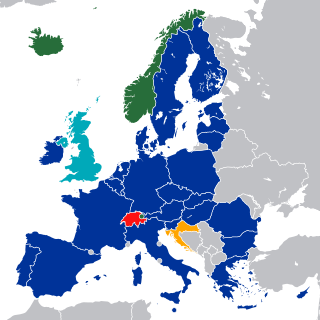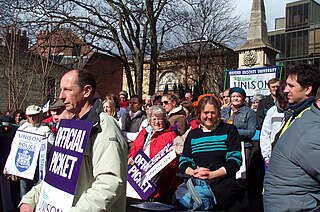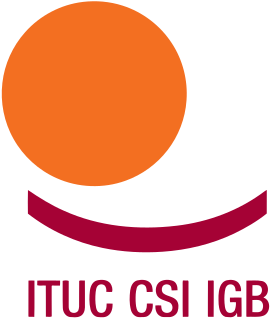
A customs union is generally defined as a type of trade bloc which is composed of a free trade area with a common external tariff. Customs unions are established through trade pacts where the participant countries set up common external trade policy. Common competition policy is also helpful to avoid competition deficiency.

A free-trade area is the region encompassing a trade bloc whose member countries have signed a free trade agreement (FTA). Such agreements involve cooperation between at least two countries to reduce trade barriers – import quotas and tariffs – and to increase trade of goods and services with each other.
If people are also free to move between the countries, in addition to a free-trade agreement, it would also be considered an open border. It can be considered the second stage of economic integration.

The Commonwealth of Independent States (CIS) is a regional intergovernmental organization of 10 post-Soviet republics in Eurasia formed following the dissolution of the Soviet Union. It has an area of 20,368,759 km² and has an estimated population of 239,796,010. The CIS encourages cooperation in economical, political and military affairs and has certain powers to coordinate trade, finance, lawmaking and security. It has also promoted cooperation on cross-border crime prevention.

The World Federation of Trade Unions (WFTU) was established in 1945 to replace the International Federation of Trade Unions. Its mission was to bring together trade unions across the world in a single international organization, much like the United Nations. After a number of Western trade unions left it in 1949, as a result of disputes over support for the Marshall Plan, to form the International Confederation of Free Trade Unions, the WFTU was made up primarily of unions affiliated with or sympathetic to communist parties. In the context of the Cold War, the WFTU was often portrayed as a Soviet front organization. A number of those unions, including those from Yugoslavia and China, left later when their governments had ideological differences with the Soviet Union.

The European Economic Area (EEA), which was established via the EEA Agreement in 1992, is an international agreement which enables the extension of the European Union (EU)'s single market to non-EU member parties. The EEA links the European Union member states and three European Free Trade Association states into an internal market governed by the same basic rules. These rules aim to enable free movement of labour, goods, services, and capital within the European Single Market, including the freedom to choose residence in any country within this area. The EEA was established on 1 January 1994 upon entry into force of the EEA Agreement. The contracting parties are the European Union (EU), its member states, and three EFTA member states.

A trade agreement is a wide-ranging taxes, tariff and trade treaty that often includes investment guarantees. It exists when two or more countries agree on terms that helps them trade with each other. The most common trade agreements are of the preferential and free trade types are concluded in order to reduce tariffs, quotas and other trade restrictions on items traded between the signatories.
A trade bloc is a type of intergovernmental agreement, often part of a regional intergovernmental organization, where barriers to trade are reduced or eliminated among the participating states.
A national trade union center is a federation or confederation of trade unions in a single country. Nearly every country in the world has a national trade union center, and many have more than one. When there is more than one national center, it is often because of ideological differences—in some cases long-standing historic differences. In some regions, such as the Nordic countries, different centers exist on a sectoral basis, for example for blue collar workers and professionals.
A European Union Association Agreement is a treaty between the European Union (EU), its Member States and a non-EU country that creates a framework for co-operation between them. Areas frequently covered by such agreements include the development of political, trade, social, cultural and security links. The legal base for the conclusion of the association agreements is provided by art. 217 TFEU.

Trade unions in the United Kingdom were first decriminalised under the recommendation of a Royal Commission in 1867, which agreed that the establishment of the organisations was to the advantage of both employers and employees. Legalised in 1871, the Trade Union Movement sought to reform socio-economic conditions for working men in British industries, and the trade unions' search for this led to the creation of a Labour Representation Committee which effectively formed the basis for today's Labour Party, which still has extensive links with the Trade Union Movement in Britain. Margaret Thatcher's governments weakened the powers of the unions in the 1980s, in particular by making it more difficult to strike legally, and some within the British trades union movement criticised Tony Blair's Labour government for not reversing some of Thatcher's changes. Most British unions are members of the TUC, the Trades Union Congress, or where appropriate, the Scottish Trades Union Congress or the Irish Congress of Trade Unions, which are the country's principal national trade union centres.
Trade unions in South Africa have a history dating back to the 1880s. From the beginning unions could be viewed as a reflection of the racial disunity of the country, with the earliest unions being predominantly for white workers. Through the turbulent years of 1948–1991 trade unions played an important part in developing political and economic resistance, and eventually were one of the driving forces in realising the transition to an inclusive democratic government.

The International Trade Union Confederation is the world's largest trade union federation. It was formed on 1 November 2006, out of the merger of the International Confederation of Free Trade Unions (ICFTU) and the World Confederation of Labour (WCL). The Founding Congress of the ITUC was held in Vienna and was preceded by the dissolution congresses of both the ICFTU and the WCL. The ITUC has three main regional organizations – the Asia-Pacific Regional Organization, the American Regional Organization, and the African Regional Organization. The Trade Union Development Cooperation Network (TUDCN) is an initiative of the ITUC whose main objective is to bring the trade union perspective into international development policy debates and improve the coordination and effectiveness of trade union development cooperation activities.

The Federation of South African Trade Unions (FOSATU) was a trade union federation formed at a congress over the weekend of 14–15 April 1979 in Hammanskraal and officially launched five days later on 20 April. Its roots lay in the unions which had emerged from the spontaneous 1973 strike wave by black workers in Durban and Pinetown.

The European Union Customs Union (EUCU) is a customs union which consists of all the member states of the European Union (EU), Monaco, and some dependencies of the United Kingdom which are not part of the EU. Some detached territories of EU members do not participate in the customs union, usually as a result of their geographic separation. In addition to the EUCU, the EU is in customs unions with Andorra, San Marino, and Turkey, through separate bilateral agreements.

The European Union has concluded free trade agreements (FTAs) and other agreements with a trade component with many countries worldwide and is negotiating with many others.

The Trades Union Congress (TUC) is a national trade union centre, a federation of trade unions in England and Wales, representing the majority of trade unions. There are fifty affiliated unions, with a total of about 5.6 million members. The current General Secretary is Frances O'Grady.

Brexit is the withdrawal of the United Kingdom (UK) from the European Union (EU). Following a referendum held on 23 June 2016 in which 51.9 per cent of those voting supported leaving the EU, the invocation of Article 50 of the Treaty on European Union started a two-year process which was due to conclude with the UK's exit on 29 March 2019, a deadline which was later extended to 31 October 2019.
The labour movement or labor movement consists of two main wings, the trade union movement or labor union movement, also called trade unionism or labor unionism on the one hand, and the political labour movement on the other.











